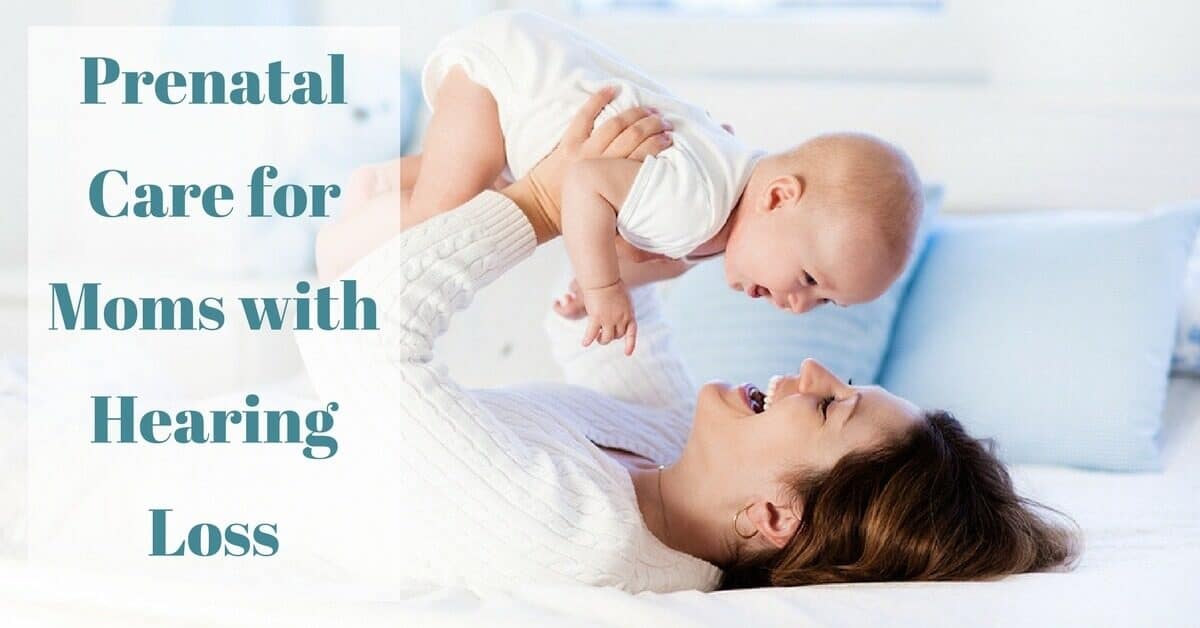Most people think hearing loss only affects seniors. After all, the most common kind of hearing loss is presbycusis, or age-related hearing loss, right?
While it’s true that many seniors suffer from hearing loss, people of all ages struggle to hear, and hearing loss isn’t restricted by age. In fact, over 1% of Americans between the ages of 18 and 44 have hearing loss, and are hard of hearing or even deaf. These individuals often feel isolated and disconnected from their peers. Hearing loss is an invisible disability that no one expects to encounter in a young adult, so these individuals feel marginalized by the people around them.
Hearing loss can be especially difficult for soon-to-be mothers who are navigating prenatal care while struggling to live with hearing loss.
How Mom’s Hearing Loss Affects the Baby
The unfortunate reality is that babies born to moms with hearing loss are far more likely to be born premature or have a low birth weight. This is according to the American Journal of Preventive Medicine, which is always looking for ways to improve health and wellness before it becomes a concern. A recent study looked at data from the across the country and discovered that of the 18 million babies born between 2008 and 2011, 10,500 babies were born to women with hearing loss. While the babies born to hearing moms were mostly healthy, the babies born to moms with hearing loss had a much greater risk of preterm deliveries, or a dangerously low birth weight.
How Hearing Loss Affects Mom’s Health
Moms who are deaf or hard of hearing struggle to access appropriate care to manage their own or their baby’s health. These moms often have other health concerns along with hearing loss, but have difficulty communicating health concerns and symptoms to healthcare professionals who don’t have training in how to communicate effectively with hard of hearing individuals. Not finding beneficial medical care, these expecting mothers are dissatisfied with their health provider and have a distrust of the medical profession in general, so they often don’t access appropriate prenatal care. In fact, a recent study out of the Lurie Institute for Disability Policy at Brandeis University found that women struggling with hearing loss were “less satisfied with their care and were more likely to have fewer prenatal visits than hearing women.”
Not only do these moms have difficulty getting good care, their hearing loss leaves them unable to get the benefits from mass media messages that provide incidental learning to the public. These messages could warn about the risks of certain behaviors, or advise women to have regular prenatal checkups throughout their pregnancy. Because they have fewer doctor visits and receive far less incidental learning than hearing women, hard of hearing moms have less complete understanding of health factors, and are less likely to identify possible problems in the pregnancy. They also have fewer support systems, since there are few classes designed to help hard of hearing mothers manage the stressors of pregnancy and birth.
Women with hearing loss are also way more likely to rely on Medicare to cover their pregnancy costs. They usually fall within a lower income bracket, and can’t afford private health care. High costs and lack of knowledge means they don’t prioritize prenatal checkups, and may miss important milestones in their baby’s prenatal development. Fewer hard of hearing mothers are able to access private health care than hearing mothers, and many have their babies delivered at urban teaching hospitals.
Treating Hearing Loss
Seeking treatment for hearing loss is a good first step in addressing health problems for expecting mothers. Treating hearing loss for mothers would increase access to public health announcements, knowledge of prenatal care required, and an ability to communicate effectively with healthcare professionals to ensure quality prenatal care for both mothers and babies. Soon to be moms with hearing aids could also get the supports they need from first time parent groups.
At My Hearing Centers, we offer hearing devices designed to be cost effective, versatile, easy to use, and life changing. To get the best for you and your baby, visit us today for a hearing assessment and to explore treatment options.


